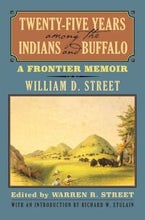"An exciting narrative of frontier Kansas."—Kansas History
"A very interesting, highly readable memoir. Seasoned American historians would find this piece to be quite valuable, and this is a fantastic and engaging read for the general public as well."—The Chronicles of Oklahoma
"Rich in everyday Kansas life on the farm, a covered wagon train experience, the military, and the last Indian raid in Kansas."—Valley Falls Vindicator
"William D. Street’s memoir of life on the central and northern Great Plains as a teamster, soldier, homesteader, trapper, buffalo hunter, scout and cowboy is about as exciting as it gets for a vivid, page-turning reminiscence of the Old West. This is an important and highly recommended memoir."—John Monnett, author of Tell Them We Are Going Home: The Odyssey of the Northern Cheyennes
"Twenty-Five Years among the Indians and Buffalo offers an interesting, highly readable, and informative personal narrative covering events and experiences of real significance for early, post–Civil War settlement of Kansas and the Great Plains. The narrator, Bill Street, who goes on to become a Kansan of some notoriety in the latter part of the nineteenth century, recounts in great detail his experiences as a teenage muleskinner in the 1860s, a trooper in the Nineteenth Kansas Volunteer Cavalry involved in the famous Winter Campaign of 1868-69, a homesteader and town builder in Jewell and Decatur counties, a High Plains hunter and trapper, a cowboy, and more. This is a significant contribution to the literature in the tradition of many other ‘eyewitness’ accounts from the nineteenth century."—Virgil Dean, editor of John Brown to Bob Dole: Movers and Shakers in Kansas History
"Twenty-five Years among the Indians and Buffalo, the memoir of William Street’s exciting decade on the Central Plains during the 1870s, is a treasure house for those interested in the history both of Kansas and of the American West. During this seminal decade of westward expansion, Street was an Indian fighter, a soldier, a buffalo hunter, a trapper, a homesteader, a town founder, and a cowboy. (Like Jack Crabb in Thomas Berger’s great novel, Little Big Man, Street seems to have been an active participant in nearly every occupation of the Old West.) Recorded in the early twentieth century, after Street had become a newspaper editor (which perhaps explains the clarity of his engaging prose), we gain new ground-level insights into activities, since mythologized, that were quotidian events for Street and his contemporaries."—Jim Hoy, author of Flint Hills Cowboys: Tales from the Tallgrass Prairie

